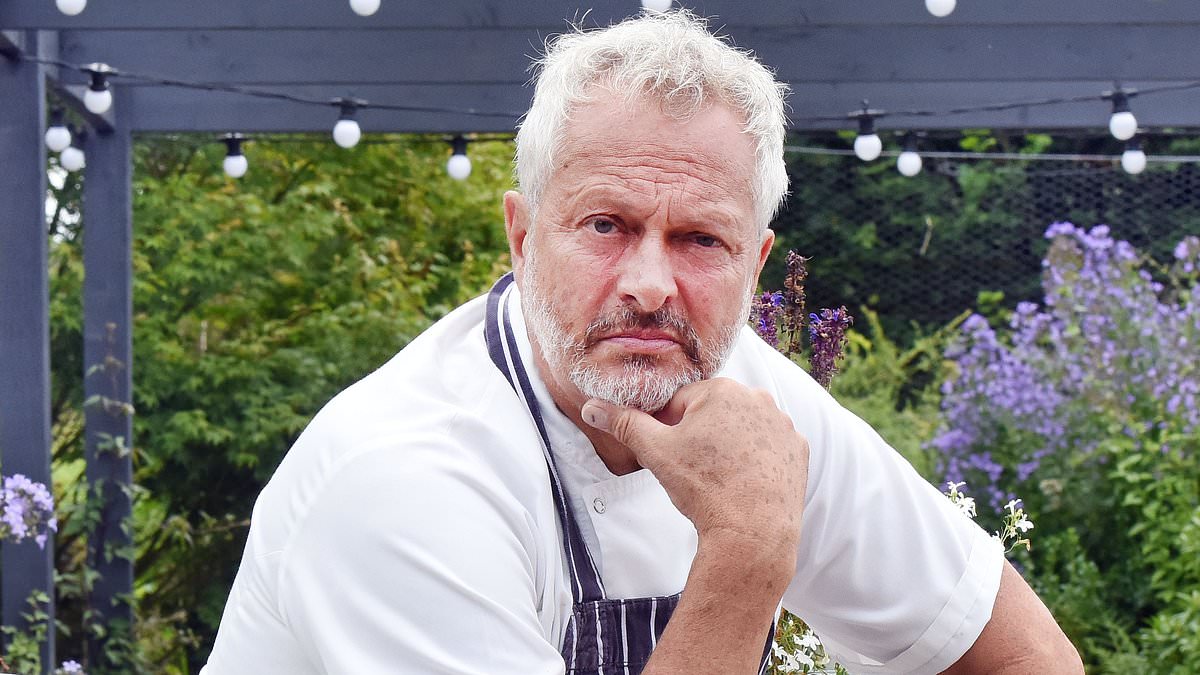There may be more genteel ways to express the exasperation endemic in Scotland’s hospitality industry, but at this moment celebrity chef Nick Nairn chooses not to seek one. The polite approach has already been tried; it failed.
He tells the Mail: ‘What you’re going to find and what you’re already seeing is people saying, “Do you know what? F*** this!”
‘Why should we knock our pans in 80 hours a week, take all the risks, because employers have all the risks of employing people, of keeping the bank at bay… juggling this all the time, and we earn f*** all?’
The 65-year-old restaurateur, who won a Michelin star within five years of opening his first business, adds: ‘At the end of the day, why are we doing this? I think increasingly you’re going to see people going, “Do you know what? Enough is enough. I’m locking up the doors.”’
In his 40-year career Nairn has never figured among the more volcanic personalities in his trade. It’s just that, on the subject of the Scottish Government and taxation, a measured tone is hard to find.

Top chef Nick Nairn warns there will be fewer places to dine out
He is passionate about his work – about good food, whether it comes from his restaurants or any of the very fine ones around the country.
Yet he says his industry stands on the edge of a precipice. Many outstanding establishments have gone over it already. Last month The Cellar in Anstruther, Fife, shut up shop without warning despite being the holder of a Michelin star and home to one of Scotland’s most admired chefs in Billy Boyter. He has not explained why. Nairn draws his own conclusions.
Le Chardon d’Or, a fine dining institution in the heart of Glasgow for more than 20 years, went under last summer, leaving many aghast. If a chef/owner of the calibre of Brian Maule could not survive the crisis, they asked, what chance did others stand?
Others still trading have turned into what one hospitality industry leader describes as ‘zombie businesses’ – operating on reduced hours and restricted menus, clinging on and praying for a political rescue package which, for now, is nowhere in sight.
Indeed, the Scottish Budget announced in December pushed that prospect further away. There were few crumbs of comfort for any Scottish business in the plan delivered by monotonal Finance Secretary Shona Robison, but for hospitality – bars, cafes, clubs, restaurants and hotels – the outlook was jet black.
They were among the biggest casualties of the pandemic. In Covid’s aftermath, food costs rocketed, interest rates rose sharply and utility bills more than quadrupled. Wage rates were up too, and Scotland’s abortive bottle return scheme had cost many outlets thousands in preparations.
In Glasgow, the introduction of a Low Emission Zone last year hit city centre trade. The same is coming this year for the cities of Edinburgh, Aberdeen and Dundee.
Yet, while the hospitality sector in England enjoyed non-domestic rates relief of up to 75 per cent, the Scottish Government refused to pass this on.
Only island hospitality businesses – already struggling to remain viable in the teeth of the CalMac ferry crisis – are receiving support in the shape of 100 per cent rates relief. On the mainland, few in the industry doubt the lack of rates relief will result in closed businesses, lost livelihoods and, ultimately, an increased benefits bill for the taxpayer.
Nairn, who operates restaurants in Port of Menteith and Bridge of Allan, both in Stirlingshire, estimates this decision alone will cost him £60,000 a year across his businesses.
Figures from trade body UKHospitality say it will cost the average pub £15,000 a year, medium-sized hotels £30,000 and hotels with 75 or more rooms £110,000. Simply, says the body, Scotland is being put at a competitive disadvantage by its own government.
‘I talk to my colleagues regularly,’ reflects Nairn. ‘And the phrase I hear the most is, “Why do we bother? Why are we doing this? There must be a better way.”’
He says the combined effects of the cost of living crisis and the failure of government to respond to the needs of business place restaurants in particular in an invidious position.
‘The problem we have now is we are busy, we are turning over millions of pounds, but we’re not making any.’
He adds: ‘Nobody wants to be the first guy that charges £20 for a burger – which, by the way, is the price that we should be charging if we are to get our margins.
‘Everybody is running, I would think, on cost neutral.’ Electricity bills in his Port of Menteith restaurant, he says, have risen from £1,000 to £5,000 a month. Drums of cooking oil are up from £15 to £38 and his businesses use ten a week.
It means that venues may be perceived to be flourishing when in fact they are running to stand still. And pushing prices up further appears a perilous strategy when customers are already seeking ways to spend less.
The tragedy, says Nairn, is it is the smaller, independent restaurants which will disappear. ‘We’ll lose a high proportion of the really good restaurants, the ones you’d be proud to say are Scottish restaurants.

Nairn’s, the celebrity chef’s restaurant in Bridge of Allan

Leon Thompson, executive director of UKHospitality Scotland, says the Scottish Budget was counterproductive

Marc Crothall of the Scottish Tourism Alliance
‘Nobody is proud to say they have a McDonald’s on their high street, but they’re proud to say we’ve got a small, independent, family-run business doing really nice food that has created a buzz.
‘This is why people like myself are in the industry, because it’s not just about the money, it’s about feeling good about yourself, a sense of pride and achievement that I’ve done something really good. The stuffing will get knocked out of that by the reality of having to pay the bills.’
His words are born of years of frustration. Like many leading figures in his industry, he has spelled out the facts in meetings with government members and clocked the nods of apparent understanding.
But nothing has come of them, he says.
‘If I’m honest, I think we’re all seeing what has been happening in Scotland for a long time now. People have been scared to open their mouths, to question things, because there has been a culture of secrecy, a culture of obfuscation.
‘There is also a culture where people who stick their heads above the parapet and question the edict of the day are punished.’
It is then, trade body leaders who stick their heads above the parapet on their members’ behalf. Last month, three of them appeared at the Scottish parliament’s economy and fair work committee and laid out the realities facing the sector as sceptical Nationalist MSPs attempted to divert the blame to Westminster.
‘I can honestly say that our members feel this current situation is worse than Covid,’ Colin Wilkinson of the Scottish Licensed Trade Association (SLTA) told them.
Lest anyone remained in doubt about where his members laid the blame, he shared SLTA survey results showing 96 per cent of respondents believed Holyrood was out of touch with businesses and their requirements.
He said 190 pubs and bars had closed in Scotland since Covid and 130 more were projected to close this year. That is twice the rate in England. Of those still open, 57 per cent were operating reduced hours in January and February.
Marc Crothall, of the Scottish Tourism Alliance, read MSPs on the committee a letter sent to him by an independent operator. It said: ‘Sadly, I feel as an independent operator part of a dying breed where the future will see global chains running hospitality in Scotland as they will be the only ones left who can offset the costs of operating.’
Leon Thompson, executive director of UKHospitality Scotland, told the committee the 75 per cent rates relief issue ‘really rankled’ with his members – who operate in 14,000 venues across Scotland – and they believed it demonstrated a ‘lack of respect’.
Mr Thompson told the Mail this week there was much talk of ‘resetting the relationship with business’ from Humza Yousaf when he became First Minister last year.
He said: ‘The real test was always going to be the Scottish Budget… and we got a Budget which was not at all helpful and actually counterproductive.’ He pointed to a ‘fracture’ in government thinking on how public money was generated.
‘Government needs businesses to thrive so that politicians have money to spend on the public services that we want to see,’ he said.
Many outlets were ‘teetering on the brink’, he said, while others were operating drastically reduced hours, ‘effectively turning themselves into zombie businesses’.
‘We’re missing such a huge opportunity in Scotland just now. Our industry has so much potential to grow. We could be creating more good jobs, we could be investing more in new businesses right across the country, helping to tackle some of the issues Scotland is facing in terms of the population, in terms of health inequalities, but instead we are taking the money away at source and just leaving businesses, many of them, to wither on the vine.’
For hospitality companies operating across the UK, the cross-Border disparity is particularly stark. Russell Imrie is president of BWH Hotels GB, which provides sales and marketing services to member hotels that remain independently owned. He said the 22 member hotels in Scotland look on their English counterparts ‘with envy’.
‘They are facing huge increased rates costs, and hotels and businesses in England don’t have that and they’re able to invest and be more profitable.’
The bottom line, he said, is there are only two ways to defray the rates charges collected by Scottish councils. Either charge the customer more or scale back in investment in the property.
Neither option was viable in the long term, he said. ‘Many of these hoteliers will decide to leave the industry.’
The cross-Border income tax disparity exacerbated an already dire situation, said Mr Imrie.

BWH Hotels GB president Russell Imrie says 22 member hotels in Scotland look on their English counterparts ‘with envy’
‘If you are at a managerial level in the hotel industry and considering your next career move, why would you consider a move into Scotland when you are going to have to pay more income tax than a similar move into England?’
He urged the Scottish Government to view hospitality as a ‘dynamic UK-wide industry’ where a ‘level fiscal playing field’ was a necessity. ‘I’m quite sure the Scottish Government… would not want to say that businesses in Scotland are at a financial disadvantage but in the hotel industry at present they are.’
A Scottish Government spokesman said the basic rate for non-domestic properties with a rateable value up to £51,000 will be frozen for 2024-25, making it the lowest such rate in the UK.
The spokesman added: ‘The Budget also ensures that over 95 per cent of non-domestic properties continue to be liable for a lower property tax rate, more than anywhere else in the UK.’
The Small Business Bonus Scheme, offering up to 100 per cent relief from non-domestic rates, will be maintained, said the spokesman, and 100 per cent rates relief will be available for hospitality businesses in island communities, capped at £110,000 per ratepayer.
Yet for seasoned operators in the hospitality sector, that ‘fracture’ in understanding on how governments raise public money has never seemed more pronounced.
Nairn says: ‘The Government should be beholden to create an environment where wealth creation is encouraged because that brings tax, and tax can then be used to reinvest in just causes. You can’t have it the other way around.’
The latest Budget, it seems, rebels against this economic wisdom. At what cost to a vitally important industry, the many thousands of livelihoods depending on it and, ultimately, the taxpayer?
